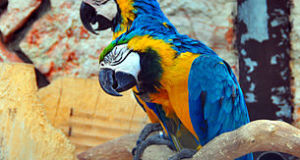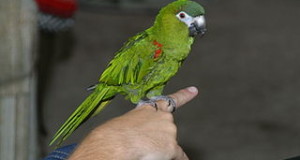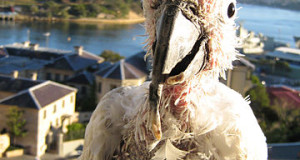A fair percentage of the avian health-related calls and emails I receive involve reports of regurgitating or vomiting in budgies, cockatoos and other parrots. Today we’ll take a look at some common causes of these problems.
Regurgitation or Vomiting?
An important first step is differentiating between regurgitation and vomiting. Vomiting, which is rather uncommon in birds, involves the expulsion of food from the upper digestive tract. The material expelled is often partially digested.
In regurgitation, the bird brings up the contents of its crop, the storage sac positioned between the esophagus and stomach. Regurgitation is a fairly common phenomenon, and may or may not be indicative of a health problem. Regurgitated food will appear whole and undigested.
The Least Worrisome Scenarios
Male birds of many species regurgitate food to their mates during courtship…pet male budgerigars, especially those housed alone, are particularly prone to this behavior. The object of their affections may be a toy or even a favored person.
Another fairly benign form of regurgitation is that which occurs in response to excitement, as when a bird overreacts to a new pet or to being left alone, or to fear. If the stress is short term, the problem will resolve itself…long term stresses are, of course, a serious matter.
Blockages and Crop Stasis
Crop stasis, in which mobility declines and food remains too long in the crop, is the most frequently encountered cause of regurgitation. It is very common in hand-fed baby parrots, and usually arises when they are given inappropriate diets. Foreign bodies or grit lodged in the crop may also be involved.
In a condition known as pendulous crop, muscle tone is lost and crop stasis becomes a more or less constant condition.
Goiter and Iodine Deficiency
An iodine deficiency will cause the thyroid to enlarge (goiter). This puts pressure on the esophagus and crop, and results in frequent regurgitation. Birds so afflicted usually have difficulty breathing and may wheeze continually.
Be sure to choose an appropriate diet for your pet, and use an iodine supplement if such is recommended by your veterinarian.
Other Health Concerns
Regurgitation may also be indicative of a wide range of other health problems, including Candidiasis, lead or zinc intoxication, antibiotic reaction or ailments of the pancreas, liver or kidneys.
Unfortunately, there is no simple way to diagnose these from the mere presence of regurgitation – a veterinary evaluation, which may include blood and fecal tests and radiographs, will be necessary.
Further Reading
Proper care is the best preventative medicine available…please check out our extensive collection of bird care books.
Please see my other health care articles posted on this blog, including The Diagnosis and Treatment of Ailments Afflicting Cage Birds.
 That Bird Blog – Bird Care and History for Pet Birds
That Bird Blog – Bird Care and History for Pet Birds



